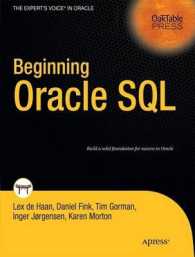- ホーム
- > 洋書
- > 英文書
- > Business / Economics
Full Description
Mainstream accounting research is dogmatising an image of efficient capital markets in which investors make rational decisions by evaluating all risks and returns of alternatives. In order to make such decisions, investors interpret unbiased information (which is equally available to all market participants) and select the alternative with the highest return or lowest risk. Behavioural accounting is challenging such simplistic assumptions. It is concerned with the explanation and prediction of human behaviour in an accounting context such as the usefulness of financial statement data, materiality judgements, decision effects of alternative accounting procedures, and the impact of culture and language on the interpretation and application of accounting pronouncements. This book gives insights into the newest developments in behavioural accounting, and provides evidence that behavioural aspects cannot be ignored in the interpretation and application of accounting information.
Contents
Preface; Information Behavior of Private Investors in the Age of the Internet; Homo Economicus in Accounting & Finance: Lessons from Behavioral Economics; Enforcement & Managers Financial Reporting Behavior: A Review of the Empirical Enforcement Literature; A Road Towards Enhanced Corporate Governance: Reconceptualisation of Accounting through Integrated Reporting; Neurosciences: The Next Frontier of Behavioral Accounting?; Index.NER(01): GB IE








